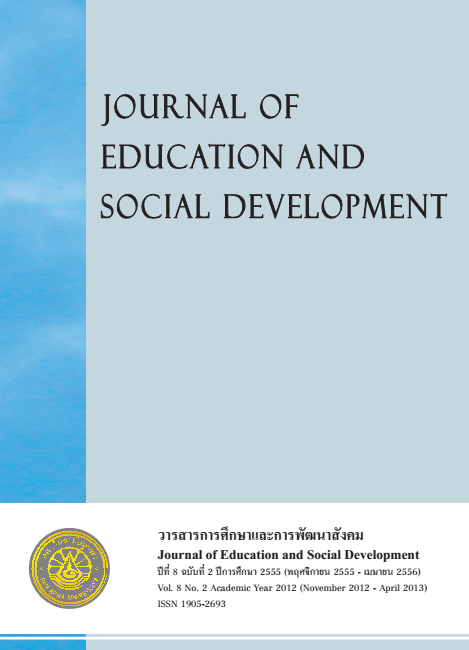ปัญหาและแนวทางพัฒนาการส่งเสริมคุณธรรมจริยธรรมนักเรียนโรงเรียนประถมศึกษา สังกัดสำนักงานเขตพื้นที่การศึกษาประถมศึกษาชลบุรี เขต 1
Main Article Content
Abstract
การวิจัยครั้งนี้ มีจุดมุ่งหมายเพื่อศึกษาปัญหาและแนวทางพัฒนาการส่งเสริมคุณธรรมจริยธรรมนักเรียน โรงเรียนประถมศึกษา สังกัดสำนักงานเขตพื้นที่การศึกษาประถมศึกษาชลบุรี เขต 1 กลุ่มตัวอย่างได้แก่ ผู้บริหารโรงเรียนประถมศึกษา จำนวน 78 คน เครื่องมือที่ใช้ศึกษาเป็นแบบมาตราส่วนประมาณค่า 5 ระดับ สถิติที่ใช้การวิเคราะห์ข้อมูล ได้แก่ คะแนนเฉลี่ย ความเบี่ยงเบนมาตรฐาน ความถี่ ร้อยละ การวิเคราะห์ความแปรปรวนทางเดียวและแนวทางพัฒนาการส่งเสริมคุณธรรมจริยธรรมนักเรียนโรงเรียนประถมศึกษา สังกัดสำนักงานเขตพื้นที่การศึกษาประถมศึกษาชลบรี เขต 1 โดยใช้วิธีสนทนากล่มุ (Focus Group Discussion) จากผู้เชี่ยวชาญจำนวน 12 รูป / คน
ผลการวิจัยพบว่า
1. ปัญหาการส่งเสริมคุณธรรมจริยธรรมนักเรียนโรงเรียนประถมศึกษา สังกัดสำนักงานเขตพื้นที่การศึกษาประถมศึกษาชลบุรี เขต 1 โดยรวมและรายด้าน อยู่ในระดับปานกลาง
2. ปัญหาการส่งเสริมคุณธรรมจริยธรรมนักเรียนโรงเรียนประถมศึกษา สังกัดสำนักงานเขตพื้นที่การศึกษาประถมศึกษาชลบุรี เขต 1 โดยรวมจำแนกตามขนาดและสถานที่ตั้งของโรงเรียน แตกต่างกันอย่างไม่มีนัยสำคัญทางสถิติ
3. แนวทางพัฒนาการส่งเสริมคุณธรรมจริยธรรมนักเรียนโรงเรียนประถมศึกษา สังกัดสำนักงานเขตพื้นที่การ ศึกษาประถมศึกษาชลบุรี เขต 1 ดังนี้
3.1 ด้านการกำหนดนโยบาย ได้แก่ ควรมีการวิเคราะห์ปัญหาและความต้องการในการพัฒนาคุณธรรม จริยธรรมกำหนดเป็นหลักสูตร ปรับวิสัยทัศน์ พันธกิจ กำหนดนโยบายส่งเสริมคุณธรรมจริยธรรม
3.2 ด้านการจัดสภาพแวดล้อม ได้แก่ ควรมีการปรับปรุงสิ่งแวดล้อมให้สะอาดทั้งภายนอกและภายใน โรงเรียน จัดภูมิทัศน์ให้เหมาะสมแก่การเรียนรู้เกี่ยวกับคุณธรรมจริยธรรม
3.3 ด้านการสอนและการนิเทศ ได้แก่ ผู้บริหาร ครู และบุคลากรทุกคนในโรงเรียนควรประพฤติตนเป็นแบบอย่างที่ดี ผู้บริหารควรเน้นให้ครูสอนสอดแทรกคุณธรรมจริยธรรมในทุกครั้งที่เข้าสอน
3.4 ด้านการจัดกิจกรรมนักเรียน ได้แก่ ควรส่งเสริมให้นักเรียนได้เข้าร่วมกิจกรรมทางศาสนากับชุมชนและเปิดโอกาสให้ผู้ปกครอง ชุมชน องค์กร ทั้งภาครัฐและเอกชน มีส่วนร่วมในการจัดกิจกรรม
3.5 ด้านการวัดการประเมินผลทางจริยธรรม ได้แก่ ควรแต่งตั้งผู้รับผิดชอบโครงการ กิจกรรมงานติดตาม ประเมินผล ยกย่อง ชมเชย ประกาศเกียรติคุณแก่นักเรียนที่มีคุณงามความดี
The purposes of this research aimed to study the problems and guided development of ethics and morals promotion of students in schools under Chonburi Primary Educational Service Area Office 1. The sample consisted of 78 school administrations. The research instrument was a rating-scale questionnaire and focus group discussion technique. Data analysis was performed by using mean score, standard deviation, frequency, percentage, One-Way ANOVA analysis The results of this research were as follows;
1. The problems of ethics and morals promotion of students in schools under the Chonburi Primary Educational Service Area Office 1 were at the moderate level.
2. The problems of ethics and morals promotion of students in schools under the Chonburi Primary Educational Service Area Office 1, compared by school size and location of schools, were found no significant difference.
3. The main guidelines for development of promotion ethics and morals of students in schools under Chonburi Primary Educational Service Area Office 1. were:
3.1 Policy setting; The school principal should analyze problems and needs on ethics development and develop it in to curriculum, vision, mission and policies.
3.2 Environment; The school principal should improve school environment, cleaning up both inside and outside the building as well as landscape appropriate with ethics nurturing.
3.3 Teaching and Supervision; School principal, teachers and school personal should behave as an ethical model and the principal encourage the teachers to teach ethics in every class.
3.4 Student activities; the school principal should support students to join the religions ceremony with community and invite parents, community, local organization (both private and public) to join the activities.
3.5 Evaluation, the school principal should appointed committee for responsible for the ethical project and follow up, promote and publicize and widespread the goodness of the students.

